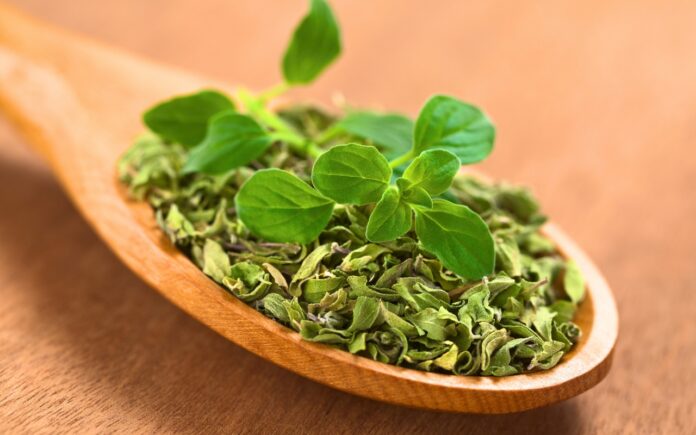Oregano enhances the flavor of food items that are savory. Its anti-inflammatory antioxidant and antimicrobial qualities could also provide health benefits. The potential medical benefits include cramps, diabetes, and more.
It could also reduce the chance of developing cancer.
Oregano is a plant belonging to the mint family, also known as the Lamiaceae family. People have been using it over the years to flavor food and treat illnesses. It is part of the Mediterranean diet.
The Greeks and Romans were once believed to associate oregano with happiness and joy. Its name is derived from the Greek words”oros,” meaning mountain, and “ganos,” meaning joy.
There are many varieties of oregano. The most popular kind can be described as Oregano vulgare, which is also called Spanish thyme or wild marjoram.
The use of oregano is in their diets as a source of nutrients and also as an oil that smells delicious.
The antioxidants carvacrol, thymol, terpinene, limonene, caryophyllene, ocimene, and thy provide the herb with its flavor and aroma. They also aid in the benefits of the health benefits of oregano oil. Oregano also contains additional antioxidants when people take it as a part of their diet.
Benefits
Oregano could help fight bacteria, reduce inflammation and help regulate blood sugar.People all over across the Mediterranean region have been using oregano for ages in herbal remedies to treat a variety of illnesses, such as:
- skins sores
- Muscles that are aching
- asthma
- cramping
- diarrhea
- indigestion
- colds
- to improve overall health
Scientists must conduct more research in order to verify the advantages of using oregano however there is evidence to suggest it can aid in:
- Combat the spread of bacteria
- relieve inflammation
- regulate blood sugar levels and control lipids and blood sugar
- Combat to beat cancer
Oregano and other plants provide antioxidants. Dietary antioxidants aid the body to remove free radicals. Free radicals are harmful substances arising from natural processes and environmental stressors. The accumulation of free radicals could trigger an oxidative stress. Oxidative stress may cause damage to cells that can cause a variety of diseases such as diabetes and cancer.
Antibacterial properties
The primary ingredients of the essential oil of oregano include thymol and carvacrol. They may also have antimicrobial properties.
In a study conducted in the year 2019 carvacrol and thymol were found to prevent diverse varieties from Staphyloccus aureus (S. aureus) bacteria from growing in dairy and meat products and dairy products, indicating that they could assist in controlling the growth of bacteria in food items.
With the growing concern of infections that are resistant to antibiotics, researchers conducted lab tests to examine the effects of the oil of oregano on different microbes that are not responding to other medications.
The oil demonstrated “significant antibacterial properties” against 11 of these microbes. This suggests that the compounds found in oregano may be involved in the fight against diseases that do not respond to antibiotics.
These tests suggest that the compounds found in oregano could contain antibacterial properties; however, eating oregano doesn't guarantee that it will stop infections.
Vitamin C is an antioxidant that plays an important role in our immune system. What foods are rich in vitamin C? Learn more here.
Anti-inflammatory properties
According to a literature review the oils and components of oregano oils, like thymol and Rosmarinic acid, seem to possess anti-inflammatory properties.
In studies on animals Oregano extract has been shown to reduce inflammation, which could cause:
- autoimmune arthritis
- Allergy Asthma
- rheumatoid arthritis
It is important to note that the research used concentrate extracts from oregano. This isn't identical to humans who consume oregano as part of their diet.
Rosemary is another plant that could contain anti-inflammatory properties. Learn more about it.
Preventing cancer
Certain ingredients in oregano could contain anticancer properties.
Scientists have discovered evidence to suggest that extracts could help prevent DNA destruction in cells caused by radiation, oxidative stress, and mitogens, a type of protein that causes unintentional cell division.
Researchers have also discovered evidence that thymol and carvacrol could help prevent the growth of melanoma cells or spreading to other skin cancers.
While eating oregano in its entirety will not prevent cancer, a variety of plant-based diet high in antioxidants can help to prevent cells from undergoing changes that can result in cancer.
The study conducted in 2013 revealed that Origanum majorana might assist in slowing or stopping the growth of metastatic breast cancer.
Diabetes
Oregano's compounds may aid in helping combat the symptoms of type 2 diabetes. The authors of a rodent study found that Origanum extracts could be beneficial:
- increase insulin resistance
- Control the activity of gene expression that influences carbohydrates and fats' metabolism.
- Restore damaged kidney and liver tissues
The authors pointed out that many people already use oregano leaves and oil to control high blood sugar levels.
Type 1 diabetes is an auto-immune disease. Researchers are unsure of what causes it; however, the stress of oxidative stress may play an important role. Researchers discovered that an extract of oregano benefited the severity of type 1 diabetes for mice. They speculated that this may be due to the antioxidant properties, its effects on the body's immune system, and its capacity to stop the death of cells.
Depression
In 2018, researchers studied how treatment with oil of oregano and other chemicals affected rats suffering from depression caused by chronic and unpredictability in stress.
After 14 days of treatment, the stress-related behavior improved in rats receiving the treatment with oregano. The researchers concluded that oregano could help relieve the effects of stress.
Other health benefits may also be beneficial.
As per the National Library of Medicine, people use products containing oregano by mouth to:
- coughs
- asthma
- Allergies
- Croup
- The bronchitis
- Painful menstrual cramps
- rheumatoid arthritis
- urinary tract diseases and disorders
- headaches
- Diabetes
- bleeding following a tooth extraction
- heart problems
- high cholesterol
The oil of oregano is often applied on their skin for:
- Acne
- Foot of an athlete
- dandruff
- toothache, sores from the canker, and gum disease
- warts
- injuries
- Ringworm
- Rosacea
- psoriasis
- bites of insects and to repel insects
- joint and muscle discomfort
- varicose veins
There isn't enough evidence to justify oregano's medicinal value as a herb for dietary use supplement or oil in the majority of these instances.
But, it's unlikely to cause harm for the majority of people if people don't consume excessive amounts of oregano oil. Also, ensure that any applications for topical use are only diluted versions from the oil.
Nutrition
There are many types of oregano, and the antioxidant and nutrient content can vary widely.
The table below shows some of the nutrients in one teaspoon (tsp), or 1 gram (g) of dried oregano leaves.
It also shows how much an adult needs of each nutrient, according to the 2015–2020 Dietary Guidelines for Americans. Requirements vary according to the individual’s sex and age.
- Energy (calories):
Amount: 2.7
Daily adult requirement: 1,800-3,000 - Carbohydrate (g):
Amount: 0.7
Daily adult requirement: 130 - Fiber (g):
Amount: 0.4
Daily adult requirement: 25.2-33.6 - Calcium (milligrams mg):
Amount: 16.0
Daily adult requirement: 1,000-1,200 - Phosphorus (mg):
Amount: 1.5
Daily adult requirement: 700 - Potassium (mg):
Amount: 12.6
Daily adult requirement: 4,700 - Folate (mcg, DFE):
Amount: 2.4
Daily adult requirement: 400
Tips for cooking
People can make use of the leaves dry or fresh to impart a an “Mediterranean” taste to various recipes.
It matches tomatoes well and is frequently used in pasta sauces and pizzas.
People are also adding it to:
- baked goods
- vegetable dishes
- legumes, including chickpeas, lentils, and chickpeas
- Fish
- chili dishes
Here are some ideas for incorporating it into foods:
- When cooking, dust the meat and chicken with oregano to give it flavor.
- It can be used in marinades or stuffings.
- Chop and mix it into pizza dough or bread dough for a smoky flavor.
- Fresh oregano leaves can be added to salad.
- Sprinkle on slices of tomato and mozzarella cheese and drizzle olive oil on top.
To reduce the flavor To reduce the flavor, try these:
- Incorporate at the final stage of cooking for the greatest flavor.
- Chop, crush or crush the leaves for more flavor.
- Start small and increase the amount if you exceed your limit, which can make food bitter.
If a recipe calls for one teaspoon of dried oregano, that is the equivalent of one tablespoon of freshly-picked oregano.
You can purchase dried oregano or fresh from supermarkets. It is also possible to grow it in pots on a balcony, window, or garden. This is an annual meaning it will be cultivated throughout the through the year.
Many different varieties of oregano can be found to buy online, such as dried oregano and seeds that you can grow the herb using.
Risks
Oregano as a plant oil, supplement, or herb is considered suitable for most people.
But, they should
Consult their physician before taking any supplement particularly if they are taking any other medication or suffer from an illness.
Avoid products containing oregano for two weeks prior to surgery as it could increase the chance of bleeding.
dilute essential oils before using by mixing them with an oil carrier, like olive oil or even in water, such as for steam baths. The amount of oregano oil must not exceed 1 percent, otherwise skin irritation could be experienced.
It could be hazardous to ingest essential oils or apply their oils on the skin. The user must be aware of the right procedure for each product to avoid toxic.
Oregano could affect your body's capacity to absorb iron, copper and zinc. It can also affect blood sugar levels.
Anyone who is allergic to plants of the Lamiaceae family, which includes basil, lavender mint, sage, and oregano, should be aware that they may have an allergic reaction to oregano.
Q:
Do you want to add drops of oil from oregano in food items?
A:
There is a way to take oregano oil. There isn't a standard dosage for it. However, applying a small amount to foods after cooking is probably secure. Mix the drops with the food prior to eating.
















